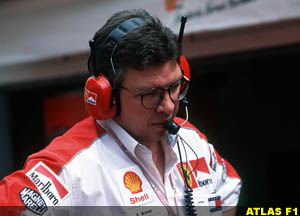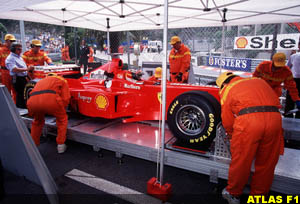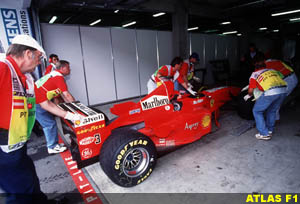|
 Much speculation has been made as of late, about Ferrari's car alleged illegality. After the last Grand Prix, once again the FIA stewards checked the car and declared it legal, as they did after Austria, Monaco and other races. Oddly enough, cynics would point out, those were all races where the Ferraris did not excel. However, Ferrari's technical director Ross Brawn, is quick to dismiss any such allegations, offering Atlas F1 readers a rare and lengthy account of how Ferrari works to keep their car within the rules. Much speculation has been made as of late, about Ferrari's car alleged illegality. After the last Grand Prix, once again the FIA stewards checked the car and declared it legal, as they did after Austria, Monaco and other races. Oddly enough, cynics would point out, those were all races where the Ferraris did not excel. However, Ferrari's technical director Ross Brawn, is quick to dismiss any such allegations, offering Atlas F1 readers a rare and lengthy account of how Ferrari works to keep their car within the rules.
"Every time we have a modification or a new package on the car" says Brawn, "it is checked at the factory to make sure that it is completely legal. The engineers are responsible for making a scrutineering check every day at the circuit,so they go onto the equipment that the FIA supplies and check the car out in the same way that the FIA would check it. It's quite a complex set of measurements. The FIA kindly make their facility available so that we can for example, check that our car complies dimensionally to all of the limits and dimensions that are in the rule book."
However, says Brawn, "there are some things that you can't check. Whenever we design a new car and it's first put on the ground, I get a few people to play devil's advocate and get in there with the rule book and try to find fault with what we have. That's something I've done at several teams in the past because sometimes you look at things from a certain angle and you can't see the weakness in an approach, whereas someone who comes at it with the view of finding fault can sometimes make sure you don't trip over things. But things can happen accidentally. I remember, a couple of years ago, we had a piece of bodywork in the wrong place and it was a genuine mistake. There was no attempt to gain advantage by being outside the regulations, it was just something that had been overlooked. But it's our responsibility. We have to do it and it's part of our normal function, every race weekend in the season."
 Do you consult the FIA before making changes to the car? Do you consult the FIA before making changes to the car?
Brawn: "Yes, we make use of the facility to get an opinion from the FIA's technical delegate, Charlie Whiting, before we use something. But it's still our responsibility to make sure that something is legal. If there's a challenge, we have to prove it to the stewards. An opinion from Charlie is just his opinion, as we found out this year, and it's not the first time or the last time that that will happen. Charlie is very fair. Whenever he gives you a document, he says that it's in his opinion: 'In my opinion, you can use it or you can't. If you want to try it and you disagree with my opinion then come to a race and we'll see what the stewards say.' There's a rule book, a set of opinions and I guess a set of precedents set by other stewards or if necessary, the appeal court."
So when exactly does the FIA's stewards make sure your car is legal?
 Brawn: "If you've qualified well, at the front of the grid, the car will go in the parc ferme and typically, they will then check a particular area in which they delve in close detail. In fairness to them, they can't scrutineer everything, the car is a very complex structure and they can't take everything apart. So one race they say, 'OK, we're going to examine your differential, we want to look at all the detail behind your differential, we want to understand it and make sure we're happy with it,' and they will do that with all the cars. Everybody knows that's how it works, so you don't take any chances, you don't do anything that's not correct because one day, that will be the choice of the FIA to examine that area carefully. So they do basic dimension checks, they do the weight check, fuel is periodically checked, and then they will concentrate on a specific area for that day or that meeting." Brawn: "If you've qualified well, at the front of the grid, the car will go in the parc ferme and typically, they will then check a particular area in which they delve in close detail. In fairness to them, they can't scrutineer everything, the car is a very complex structure and they can't take everything apart. So one race they say, 'OK, we're going to examine your differential, we want to look at all the detail behind your differential, we want to understand it and make sure we're happy with it,' and they will do that with all the cars. Everybody knows that's how it works, so you don't take any chances, you don't do anything that's not correct because one day, that will be the choice of the FIA to examine that area carefully. So they do basic dimension checks, they do the weight check, fuel is periodically checked, and then they will concentrate on a specific area for that day or that meeting."
What about electronic aids, such as traction control?
Brawn: "When it comes to computer software, we go for option one which means that the FIA scrutineers all our software before we use it. They say that it complies with the regulations and they make a copy of it, so whenever they want to look at our software, they just check what they have with what we have in the car and if the two match up, then the inspection's done. If there's a difference, then they want to examine the specific differences to make sure it's still OK. Some teams prefer to go to option two whereby they can have a pre-season check, but during the year they don't confirm the legality of their system until the FIA chose to check it thoroughly. We're more comfortable with option one and that's how we have our software scrutineered."
|

